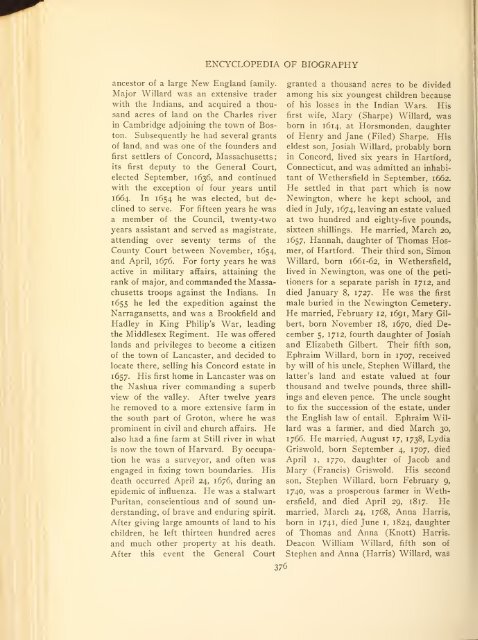Encyclopedia of Connecticut biography, genealogical-memorial ...
Encyclopedia of Connecticut biography, genealogical-memorial ...
Encyclopedia of Connecticut biography, genealogical-memorial ...
Create successful ePaper yourself
Turn your PDF publications into a flip-book with our unique Google optimized e-Paper software.
ancestor <strong>of</strong> a large New England family.<br />
Major Willard was an extensive trader<br />
with the Indians, and acquired a thousand<br />
acres <strong>of</strong> land on the Charles river<br />
in Cambridge adjoining the town <strong>of</strong> Bos-<br />
ton. Subsequently he had several grants<br />
<strong>of</strong> land, and was one <strong>of</strong> the founders and<br />
first settlers <strong>of</strong> Concord, Massachusetts;<br />
its first deputy to the General Court,<br />
elected September, 1636, and continued<br />
with the exception <strong>of</strong> four years until<br />
1664. In 1654 he was elected, but declined<br />
to serve. For fifteen years he was<br />
a member <strong>of</strong> the Council, twenty-two<br />
years assistant and served as magistrate,<br />
attending over seventy terms <strong>of</strong> the<br />
County Court between November, 1654,<br />
and April, 1676. For forty years he was<br />
active in military affairs, attaining the<br />
rank <strong>of</strong> major, and commanded the Massa-<br />
chusetts troops against the Indians. In<br />
1655 he led the expedition against the<br />
Narragansetts, and was a Brookfield and<br />
Hadley in King Philip's War, leading<br />
the Middlesex Regiment. He was <strong>of</strong>fered<br />
lands and privileges to become a citizen<br />
<strong>of</strong> the town <strong>of</strong> Lancaster, and decided to<br />
locate there, selling his Concord estate in<br />
1657. His first home in Lancaster was on<br />
the Nashua river commanding a superb<br />
view <strong>of</strong> the valley. After twelve years<br />
he removed to a more extensive farm in<br />
the south part <strong>of</strong> Groton, where he was<br />
prominent in civil and church affairs. He<br />
also had a fine farm at Still river in what<br />
is now the town <strong>of</strong> Harvard. By occupation<br />
he was a surveyor, and <strong>of</strong>ten was<br />
engaged in fixing town boundaries. His<br />
death occurred April 24, 1676, during an<br />
epidemic <strong>of</strong> influenza. He was a stalwart<br />
Puritan, conscientious and <strong>of</strong> sound un-<br />
derstanding, <strong>of</strong> brave and enduring spirit.<br />
After giving large amounts <strong>of</strong> land to his<br />
children, he left thirteen hundred acres<br />
and much other property at his death.<br />
After this event the General Court<br />
ENCYCLOPEDIA OF BIOGRAPHY<br />
376<br />
granted a thousand acres to be divided<br />
among his six youngest children because<br />
<strong>of</strong> his losses in the Indian Wars. His<br />
first wife, Mary (Sharpe) Willard, was<br />
born in 1614, at Horsmonden, daughter<br />
<strong>of</strong> Henry and Jane (Filed) Sharpe. His<br />
eldest son, Josiah Willard, probably born<br />
in Concord, lived six years in Hartford,<br />
<strong>Connecticut</strong>, and was admitted an inhabi-<br />
tant <strong>of</strong> Wethersfield in September, 1662.<br />
He settled in that part which is now<br />
Newington, where he kept school, and<br />
died in July, 1674, leaving an estate valued<br />
at two hundred and eighty-five pounds,<br />
sixteen shillings. He married, March 20,<br />
1657, Hannah, daughter <strong>of</strong> Thomas Hosmer,<br />
<strong>of</strong> Hartford. Their third son, Simon<br />
Willard, born 1661-62, in Wethersfield,<br />
lived in Newington, was one <strong>of</strong> the petitioners<br />
for a separate parish in 171 2, and<br />
died January 8, 1727. He was the first<br />
male buried in the Newington Cemetery.<br />
He married, February 12, 1691, Mary Gilbert,<br />
born November 18, 1670, died December<br />
5, 1712, fourth daughter <strong>of</strong> Josiah<br />
and Elizabeth Gilbert. Their fifth son,<br />
Ephraim Willard, born in 1707, received<br />
by will <strong>of</strong> his uncle, Stephen Willard, the<br />
latter's land and estate valued at four<br />
thousand and twelve pounds, three shill-<br />
ings and eleven pence. The uncle sought<br />
to fix the succession <strong>of</strong> the estate, under<br />
the English law <strong>of</strong> entail. Ephraim Wil-<br />
lard was a farmer, and died March 30,<br />
1766. He married, August 17, 1738, Lydia<br />
Griswold, born September 4, 1707, died<br />
April 1, 1770, daughter <strong>of</strong> Jacob and<br />
Mary (Francis) Griswold. His second<br />
son, Stephen Willard, born February 9,<br />
1740, was a prosperous farmer in Wethersfield,<br />
and died April 29, 1817. He<br />
married, March 24, 1768, Anna Harris,<br />
born in 1741, died June 1, 1824, daughter<br />
<strong>of</strong> Thomas and Anna (Knott) Harris.<br />
Deacon William Willard, fifth son <strong>of</strong><br />
Stephen and Anna (Harris) Willard, was

















